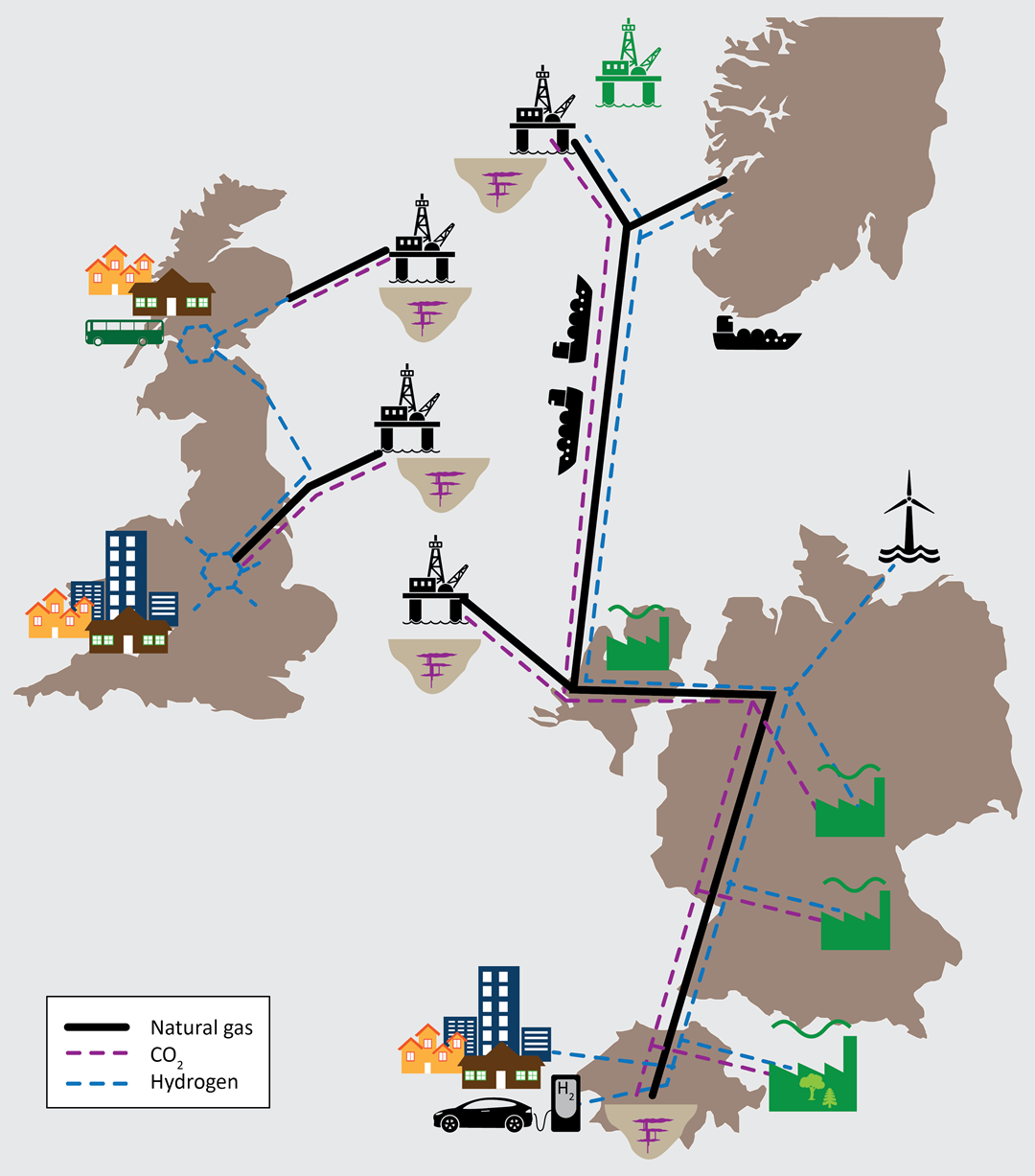
ELEGANCY – Enabling a Low-Carbon Economy via Hydrogen and CCS
Case studies – WP5
The Case Studies includes:
- The Netherlands: decarbonizing industry by specifying a comprehensive H2-CCUS value chain.
- Switzerland: decarbonizing road transport, accelerating its CCS/geothermal roadmap and studying carbon-negative solutions, which can provide vital headroom in the transition to a low carbon economy.
- The UK: switching large cities to a 100% H2 network, building on the Leeds City Gate H21 project.
- Germany: accelerating the decarbonization of gas infrastructure via a H2-CCS chain – either a pure H2 distribution network, or by mixing H2 into the existing natural gas network.
- Norway: developing an optimal infrastructure investment scenario for H2 export and utilization.
In short, H2-CCS is a truly flexible strategy for accelerating CCS deployment, easily adaptable to the infrastructural, social, economic and political constraints of European nations.
Contact: , SINTEF
All ELEGANCY partners participate in the case studies
ELEGANCY case studies
Dutch case
The Dutch case study will develop a roadmap for decarbonizing the Rotterdam Port and wider industrial region, while maintaining regional economic integrity and employment. The area depends heavily on oil and gas through import and export of oil products, oil refining and petrochemical operations as well as power generation. A credible path to decarbonization must therefore be via the implementation of H2 and CCUS. The roadmap will be developed in close collaboration with industry partners from the area, identifying the possibilities for CO2 capture, H2 and CO2 usage, as well as offshore CO2 storage, and will serve as an example for other heavy industrial areas in Europe. A particular feature in the Dutch case is the abundance of greenhouses, where CO2 for accelerating plant growth is currently produced by gas-fired heaters. Thus utilization of captured CO2 for this purpose is a CCUS application that can deliver net CO2 emission reductions.
Swiss case
The Swiss case study aims to demonstrate the key role of CCS in addressing the three major challenges highlighted below and provide the basis for the implementation of results from WPs 1, 2, 3 and 4. Transport currently accounts for 25% of global CO2 emissions and in Switzerland, where electricity is mainly generated from hydropower and nuclear power, as much as 40% of total domestic CO2 emissions. It is therefore essential to decarbonize the Swiss transport sector. The case study also aims to prepare the way for a CO2 storage site. This will be investigated alongside the development of deep geothermal energy, as recommended by the Swiss Energy Strategy 2050 and regional roadmaps for CCS and deep geothermal energy development. For this reason, the case study will favour the decarbonization of Swiss building stock, which accounts for another 30% of total CO2 emissions in Switzerland, through increased use of geothermal energy replacing NG. Finally, the Swiss case study aims to pave the way for solutions that can remove CO2 from the atmosphere, i.e. enable negative CO2 emissions. The relevance and potential for the Swiss chemicals industry is anticipated through reflection meetings with industrial project and support partners.
UK case
The H21 Leeds City Gate Project, a study of 260 000 homes, provides evidence that converting the UK gas network to 100% hydrogen, integrated with CCS, is not only technically possible but economically viable. Planning for the UK H21 Roadmap is currently in progress, which will entail large-scale deployment of H2-CCS through the wider application of the H21 findings to many UK cities. Upscaling and integration with industry is required to achieve the necessary economies of scale to reduce CO2 emissions and costs, and a sufficiently large appliance market to give a commercial basis for implementation. UK-wide incremental rollout is planned from 2026 to 2045 based around four NG reforming and CCS centres. This incremental rollout is the base case investigated in the ELEGANCY UK case study, in particular the first phase rollout to three cities and associated industrial clusters, complemented with technical and commercial feasibility studies from a petrochemicals industry perspective. WP5 research will be tailored to complement implementation planned in four technical work packages of the H21 Roadmap: WP8 Technical Standards, WP9 Regulation, WP12 Carbon Capture and Storage, and WP16 UK Wide Development Strategy. Detailed investigation of capture efficiency and energy flows will also be conducted in WP1. ELEGANCY research will be included as supporting material for the UK H21 Roadmap, ahead of the scheduled key policy decision and commitment to build in 2021. In particular, the case study will focus on uncertainties related to storage of the CO2 stream captured from NG reforming units, on business case development and on energy network development for a phased UK rollout using the value chain tool developed in WP4.
German case
The German case study also focuses on decarbonization of German natural gas as an energy carrier. The German gas grid is well developed, and decarbonization of chemical and process industry as well as households will require a large-scale transformation of infrastructure. No concepts have so far been developed for such a transition and this case study will evaluate technical challenges as well as economic, legal and public-perception issues.
Norwegian case
The Norwegian case study will evaluate the benefit of converting Norway's large natural gas resources to H2 with CCS, primarily to satisfy the expected growth in worldwide demand of H2 as an energy carrier and additionally to mitigate emissions in off-shore platforms and the transport sector. This case study will also study the possible synergies with the Norwegian full-scale CCS project.
